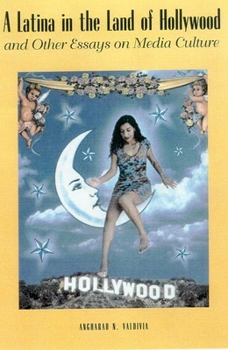A Latina in the Land of Hollywood: And Other Essays on Media Culture
From ads for Victoria's Secret to the character roles of Rosie Perez, the mass media have been defining race and femininity. In this diverse set of essays, Angharad N. Valdivia breaks theoretical and methodological boundaries by exploring the relationship of the media to various audiences. Throughout A Latina in the Land of Hollywood we are challenged to think differently about the media messages we often unconsciously consume, such as the popular representations of certain Latina cultural icons. Valdivia shows how reporters focus on Guatemalan activist Rigoberta Menchú's big smile, Brazilian media magnate Xuxa's blonde hair, and Puerto Rican actress Rosie Perez's high-pitched voice, never quite creating a comprehensive portrayal of these women. In her discussion of lingerie catalogs, Valdivia uncovers a similarly skewed depiction. The lush, high-class bedrooms of Victoria's Secret differ as much from the earthy, spare world of Frederick's of Hollywood as the types, sizes, and uses of the lingerie that the two companies sell. Valdivia takes a look at family films, arguing that single mothers are almost always portrayed as either trampy floozies or sexless, hapless women, whereas single dads fare much better. Whether examining one teenager's likes and dislikes or considering single parenthood in family films, Valdivia investigates how popular culture has become the arena in which we struggle to know ourselves and to make ourselves known. She calls for scholars to move beyond investigating implicit themes in films and media to studying the ways that audiences of different colors, ages, genders, and sexual preferences might understand or misunderstand such cultural messages. A Latina in the Land of Hollywood aims to explode traditional discussions of media and popular culture. It is a must-read for anyone interested in popular culture, television, and film.
Format:Paperback
Language:English
ISBN:0816519358
ISBN13:9780816519354
Release Date:March 2000
Publisher:University of Arizona Press
Length:216 Pages
Weight:0.70 lbs.
Dimensions:0.5" x 6.0" x 9.0"
Customer Reviews
1 rating
I'm very critical, but it's still great.
Published by Thriftbooks.com User , 23 years ago
I encourage many to read this book, but I feel compelled to give my criticisms first.Valdivia is trying to write Latinas into media studies and cultural criticism, a very noble project. But like bell hooks, a scholar by whom Valdivia is strongly influenced, the author pats herself on the back too frequently about her interdisciplinary discussions of "race, class, and gender." Also like hooks, though non-homophobic, there is an unfortunate way in which "race, class, and gender" are written in capital letters but sexual orientation is written in the lower-case. Like many Latina/o scholars, Valdivia gripes about how racial discussions overly focus on white vs. black, yet she has to use a lot of African-American scholarship to make her points. While the last half of the book is clearly about Latinas, the first have is just about women in general; this book is much more likely to be in a women's studies syllabus than an ethnic studies one (which is unfortunate). As much info as I learned about the media here, the author gets many facts wrong. She says "Set It Off" is directed by a woman; it's directed by F. Gary Gray, a man. She calls Madonna "self-named"; actually Madonna is her birth name. She says "You Can't Do That on Television" was inspired by the Xuxa Show and that can't be because the former came on before Xuxa worked on Brazilian TV in 1984. Speaking of Xuxa, the author is way too forgiving. In a minority-heavy nation like Brazil they may worship the rare blonde like Xuxa. In the white-majority US, there are plenty of blondes and Xuxa would be nothing special, yet Valdivia inadequately addresses this. The author includes this silly chapter involving her daughter. All parents think their children are little miracles. Valdivia can't be critical here. For example, she states her daughter's school has Mexican-American students, yet the mother doesn't find it problematic in the slightest that all her daughter's friends are white. Finally, her descriptions go on too long; whole sections describing Victoria's Secrets catalogues and Xuxa's success had to be skipped because they were so exhaustive.This book is critical, so maybe it just put me in a critical mood. In truth, I loved this book. If you like Coco Fusco's and Cherrie Moraga's works, you should love this too. I mean, this was a good attempt at a Latina analysis of media. In fact, this taught me a lot about the media generally because I'd pick up a book on Latinas, not a book on the media alone. Many critics say writings from "identity" scholars lack structure, but in every chapter Valdivia clearly maps out her project. Academics tend to either focus on Latinas/os in the US or Latin Americans abroad. Valdivia identifies as both and writes about both, excellently I might add. Given that Rosie Perez is "mulata", Rigoberta Menchu is indigenous, and Xuxa is white, Valdivia shows that she accepts and celebrates Latina racial diversity when she is analyzing these figures. T






